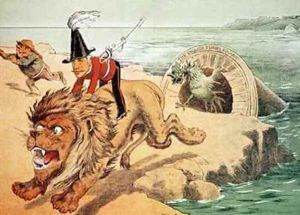Friedrich Graetz Paintings
Friedrich Graetz was a German political cartoonist and illustrator mainly active during the late 19th century. Born in 1840 in Regierungsbezirk Breslau, which was then part of Prussia and is now Wrocław, Poland, Graetz showed an early talent for art, which led him to pursue a career in illustration and cartooning.
Although not as widely recognized as some of his contemporaries, Friedrich Graetz made a considerable impact with his political cartoons, especially in the context of the rapidly changing political landscape of Europe in the late 1800s. His work often appeared in satirical magazines, where he would use his sharp wit and artistic skill to comment on political figures and events of the day.
Graetz's style was characterized by its detailed and realistic approach, which allowed him to capture the likeness and peculiarities of the personalities he depicted. This attention to detail made his cartoons a valuable document of the era's social and political life, as they often provided insightful commentary on the issues of the time.
Throughout his career, Friedrich Graetz maintained a focus on German and European politics, which was a rich source of material given the era's turbulence, including the unification of Germany under Bismarck and the various conflicts and alliances that prefigured World War I. His work not only entertained but also helped to shape public opinion on the leading figures and the political climate of the period.
Graetz passed away in 1913, just before the outbreak of World War I, a conflict that would dramatically reshape Europe and the world. While his work may not be as well-known today, his contributions to the art of political cartooning and illustration remain significant, providing historians and art enthusiasts with a vivid pictorial record of the tumultuous times in which he lived.
